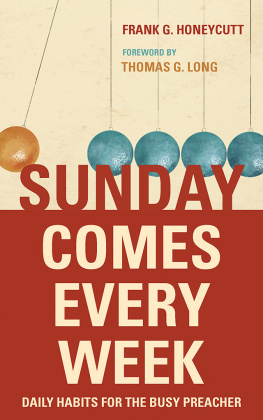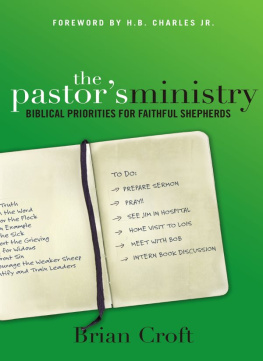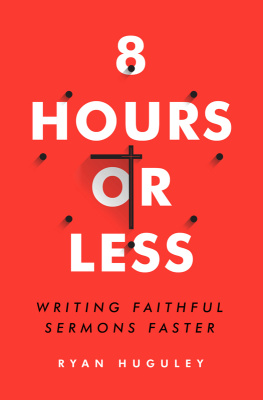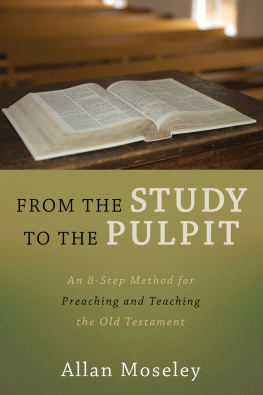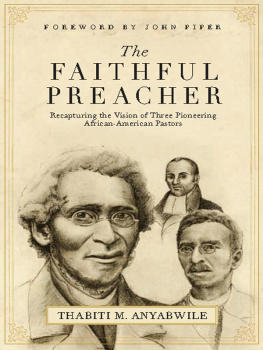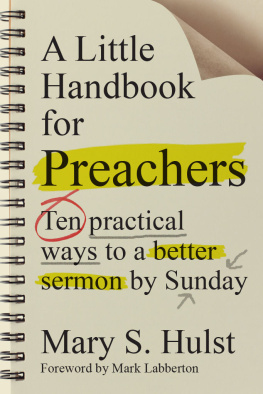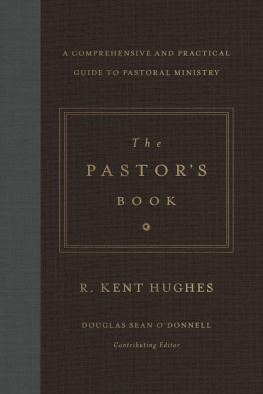Sunday Comes Every Week
Daily Habits for the Busy Preacher
Frank G. Honeycutt
WILLIAM B. EERDMANS PUBLISHING COMPANY
GRAND RAPIDS, MICHIGAN
Wm. B. Eerdmans Publishing Co.
4035 Park East Court SE, Grand Rapids, Michigan 49546
www.eerdmans.com
2019 Frank G. Honeycutt
All rights reserved
Published 2019
252423222120191234567
ISBN 978-0-8028-7645-4
eISBN 978-1-4674-5670-8
Library of Congress Cataloging-in-Publication Data
Names: Honeycutt, Frank G., 1957 author.
Title: Sunday comes every week : daily habits for the busy preacher / Frank G. Honeycutt.
Description: Grand Rapids, Michigan : William B. Eerdmans Publishing Company, 2019. | Includes bibliographical references.
Identifiers: LCCN 2018056244 | ISBN 9780802876454 (pbk. : alk. paper)
Subjects: LCSH: Preaching. | Pastoral theology.
Classification: LCC BV4211.3 .H665 2019 | DDC 251dc23
LC record available at https://lccn.loc.gov/2018056244
Contents
Frank Honeycutt hasand we can all be grateful for thispastoral imagination. The term pastoral imagination was coined by Craig Dykstra, who in his many years heading up the religion division of the Lilly Endowment was fascinated by what made ministers tick. He was particularly intrigued by the way that some pastors, like some lawyers, physicians, artists, and novelists, rise above the average to a level of extraordinary and stunning excellence in the practice of their vocation. He wondered how such excellence, which was a great gift to the church, could be spotted in advance, educated, cultivated, and nourished. He concluded that a few pastors, certainly not all and not even most, simply bring a wealth of talent and a willingness to learn to the long path of ministry, allowing them to develop a way of seeing in depth and of creating new realities. He writes,
Such ministry has about it a freshness, an improvisatory character, a liveliness that is itself infectious. Thus an imagination that is at its heart a seeing in depthseeing reality
We see this vitality and faithful innovation in these pages as Frank Honeycutt draws wisdom from his many years of parish ministry. The first evidence of his pastoral imagination is the way he tells stories. These are no stylized tales of success with the triumphant pastor riding off into the sunset. These are real stories of real ministry, narratives of struggle and hope, limitation and failure. They are like photographs of birds in flight, opportunities to gaze for a brief moment at God intersecting in human lives that are in motion, stories of the interruptions and disruptions of grace that, sometimes in almost small and unnoticed ways, open people to a new future.
As Honeycutt describes his ministry, woven into these stories of contemporary saints and sinners, seekers and avoiders, the grief-stricken and heavy-laden are the stories of the Bible. In the way he tells these scriptural narrativesand this is a second sign of his pastoral imaginationthere is no breach, no hermeneutical divide, between us and the people of the Bible. The biblical characters are the same fragile vessels for the holy as are the people who will nestle into the pews next Sunday. Moreover, Honeycutt never boils down the rich brew of the Bible so that it will pour neatly into the tiny thimbles of our world-weary, domesticated, and impoverished religious imaginations. Instead, in his hands the Bible makes us larger. He sets the Bible dancing, beckoning us to be swept up into the awe, energy, and wonder available to those who join the dance.
Like other ministers who possess pastoral imagination, Honeycutt doesnt allow his gaze to drift too far or too long into abstractions but instead finds profundity and a plentiful, if sometimes troubled, joy in the weekly tasks of ministry and the ordinary moments of peoples everyday lives. For Honeycutt, as a Christian minister, the pastoral imagination is also an incarnational imagination, not a retreat from the material and tangible but a rediscovery in every experience that the Word repeatedly becomes flesh and dwells among us (see John 1:14). In Wendell Berrys novel Jayber Crow, the pastor-like protagonist complains about preachers who lack this incarnational vision:
This religion that scorned the beauty and goodness of this world was a puzzle to me. To begin with, I didnt think anybody believed it. Those world-condemning sermons were preached to people who, on Sunday mornings, would be wearing their prettiest clothes.... The people who heard those sermons loved good crops, good gardens, good livestock and work animals and dogs; they loved flowers and the shade of trees, and laughter and music; some of them could make you a fair speech on the pleasures of a good drink of water or a patch of wild raspberries. While the wickedness of the flesh was preached from the pulpit, the young husbands and wives and the courting couples sat thigh to thigh, full of yearning and joy, and the old people thought of the beauty of the children. And when church was over they would go home to heavenly dinners of fried chicken, and creamed new potatoes and creamed new peas and hot biscuits and butter and cherry pie and
This incarnational vision creates for Honeycutt a tension between the church as it is and the church that God is bringing into being. Places matter, time matters, memories matter, and yet Honeycutt wont allow these realities to forestall the ever-beckoning outward journey of faith. He tenderly confesses, I used to love praying alone in the church sanctuary following worship after everyone had departed for Sunday lunch. It was good to rest for a few minutes in the quiet of the space, old oak pews occasionally creaking in the silence, recovering from the carried weight of Sunday assembly. And yet, he says that he is finally not content to remain there because the gospel keeps pressing him and his people outward and beyond, into the wider world of need, and into the possibilities for experiencing God that transcend any one sacred place.
It is no surprise that the spine that holds all of the material together in this book is the same constant reality that unified and symbolized Honeycutts whole ministry: the weekly sermon. This volume isnt a textbook on preaching, but it could serve as one, because Honeycutt returns again and again to the craft of sermonizing. For Honeycutt, this comes not so much because he values this one act of ministry over all others, but because all other acts of ministry are refracted through the prism of preaching. Everything good and necessary about the ministry passes through the busy intersection of the sermon: the obedient hearing of Scripture, the love of and care for the people, the attending to the cries of the oppressed, and the challenge of the gospel to mount up with wings as eagles.
Andoh, yestheres at least one other aspect of the pastoral imagination that we see in Honeycutt: the unmistakable solitariness of ministry. There is a curious, almost amusing verse in Marks Gospel: When [Jesus] was alone, those who were around him along with the twelve asked him about the parables. Alone, with people all around. Thats ministry, and Honeycutt speaks of this when he says, Pastors sign on for a career of feeling a little out of sync with the good people we are called to lead. Perhaps the idea of pastor as stranger should be replaced with the idea of pastor as simply strange.
But it is this strangeness, this out-of-sync-ness, this solitude that allows for the angular perception that is always taken by those with pastoral imagination. They see things oddly, differently, illuminated by an uncommon light. It allows pastors like Honeycutt to lead Gods people to places to which God is always calling, places these people can scarcely imagine, and, among pastors like Frank Honeycutt, one of our very best pastoral leaders, it empowers boldness.

